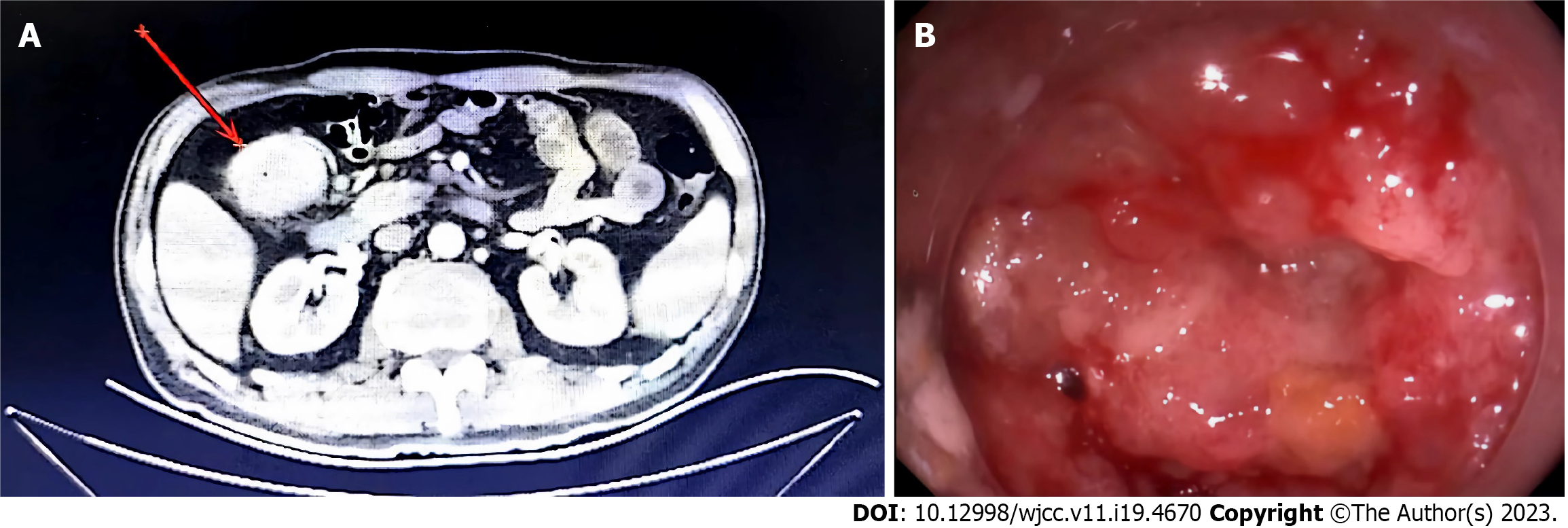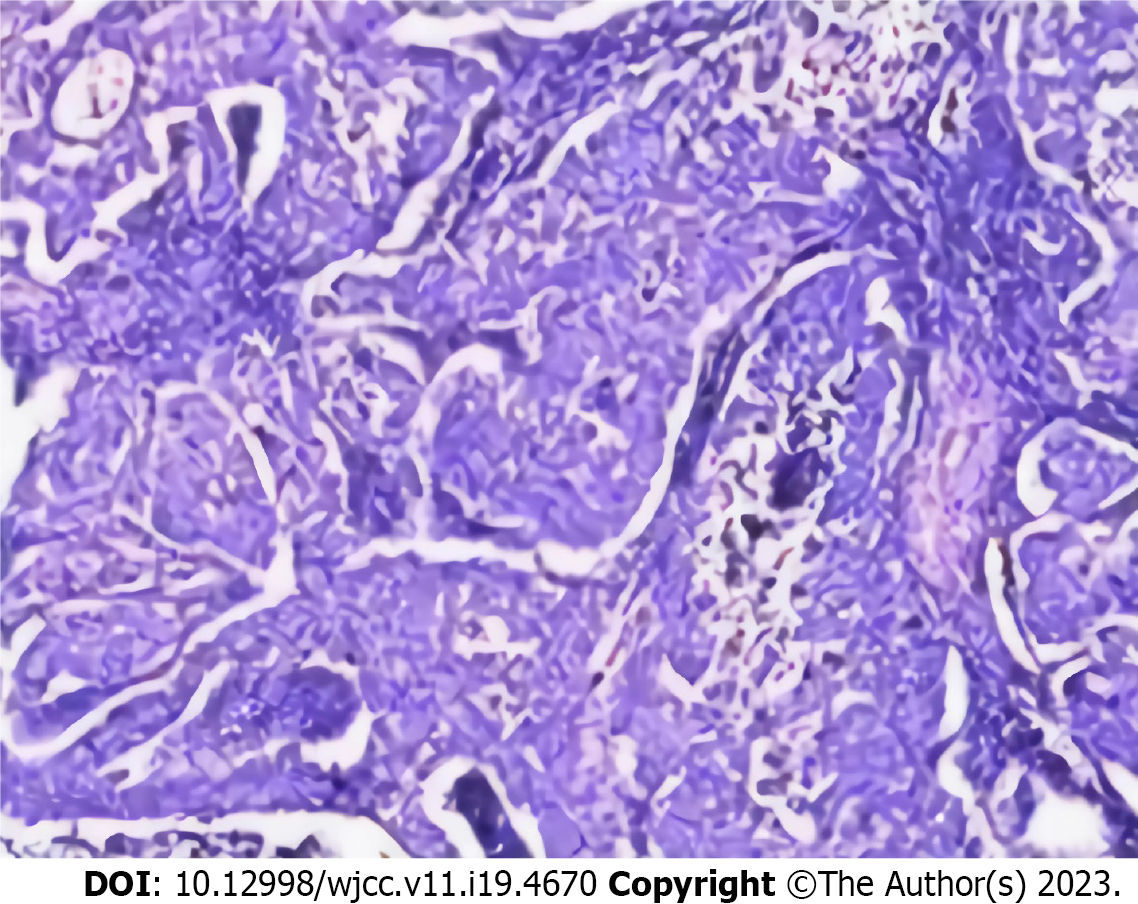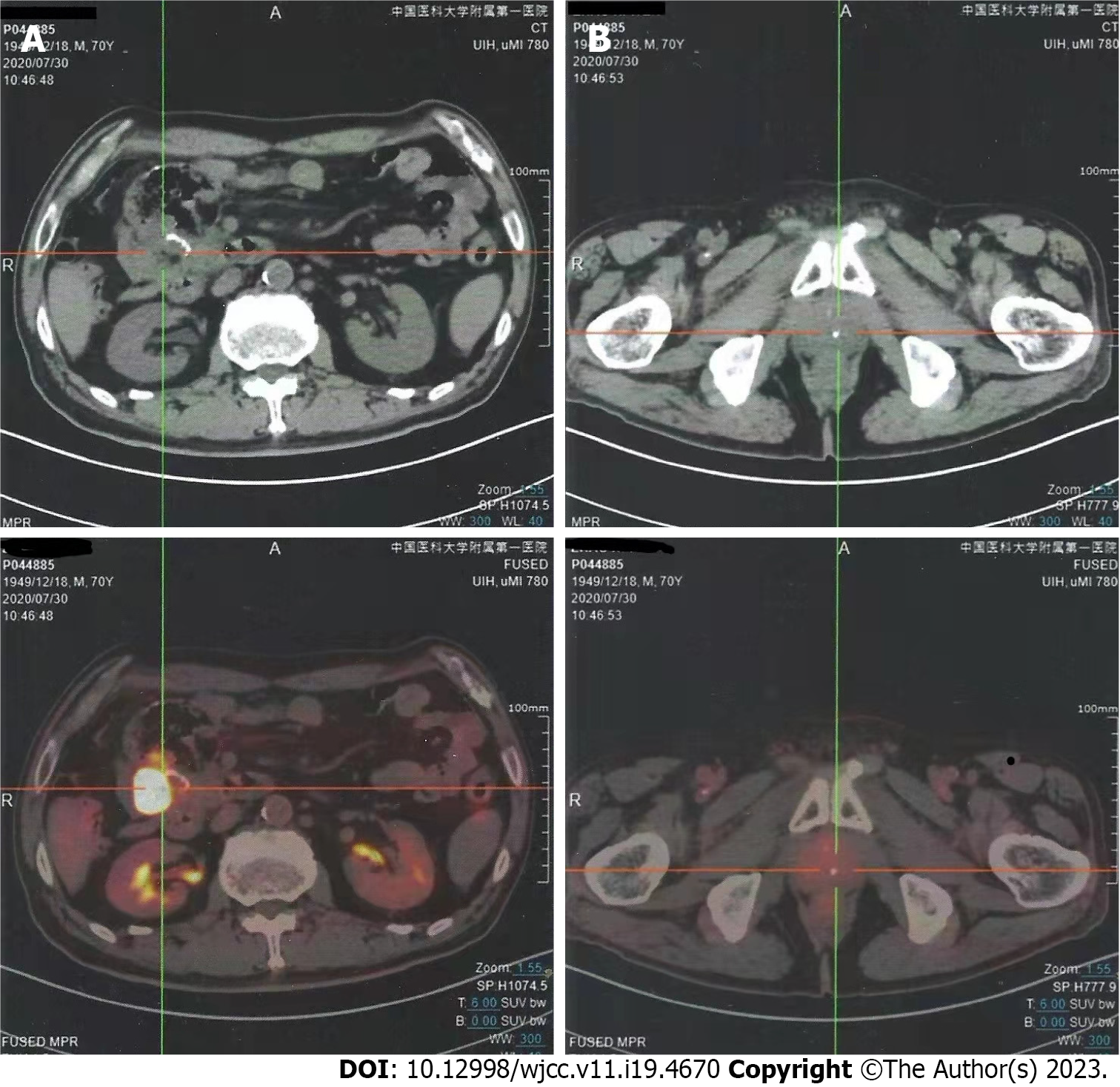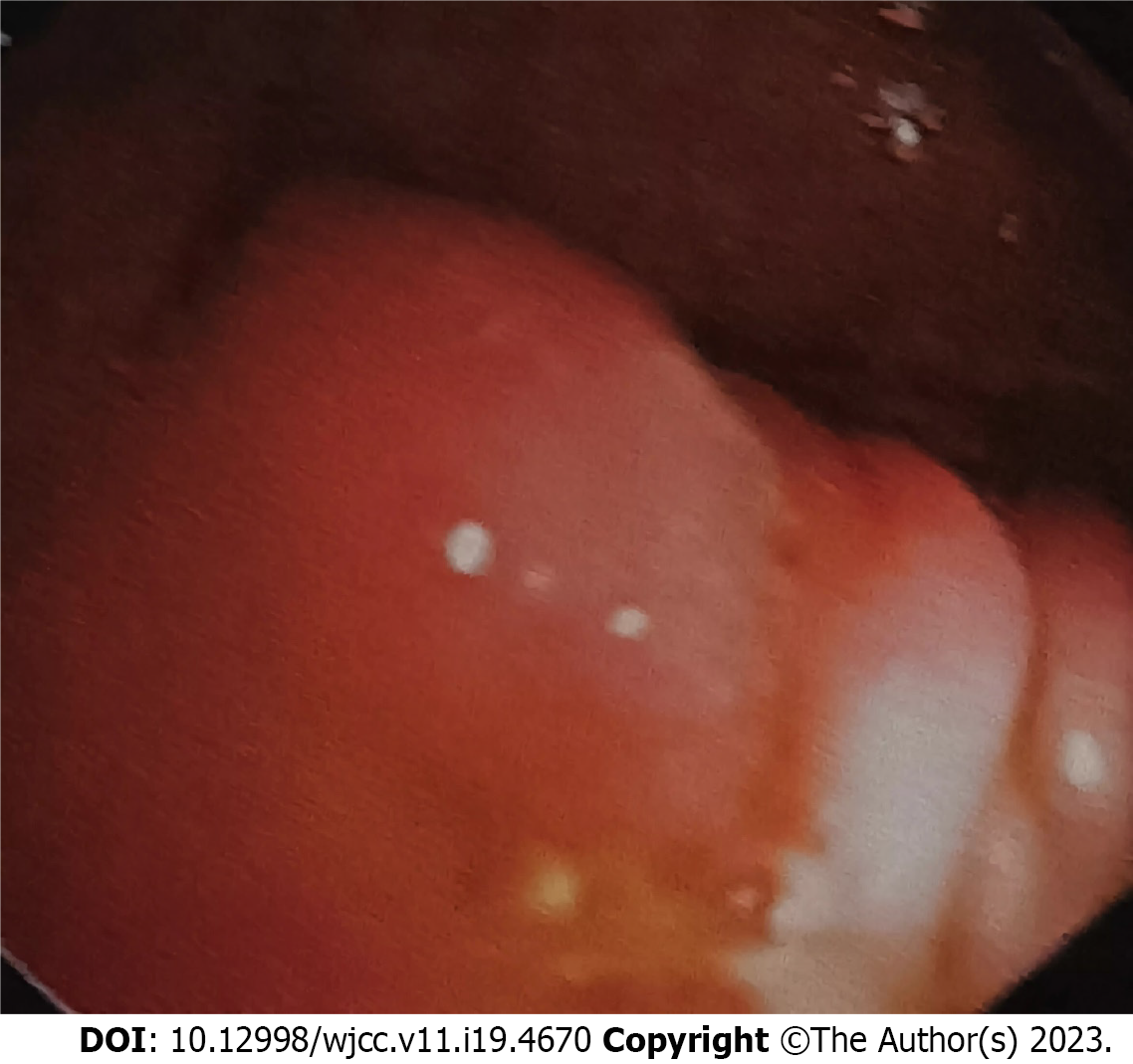Published online Jul 6, 2023. doi: 10.12998/wjcc.v11.i19.4670
Peer-review started: February 20, 2023
First decision: March 24, 2023
Revised: April 12, 2023
Accepted: May 26, 2023
Article in press: May 26, 2023
Published online: July 6, 2023
Processing time: 129 Days and 21.9 Hours
Colon cancer (CC) is one of the leading causes of cancer-related morbidity and mortality worldwide. Traditional Chinese medicine (TCM) is widely used in the treatment of various chronic diseases. CC easily metastasizes and results in high morbidity and mortality rates.
A 71-year-old man with a 12-year history of old myocardial infarction and a 7-year history of type 2 diabetes mellitus was diagnosed with CC and underwent right hemicolectomy 1 year ago. Tumor biopsy revealed moderately poorly differentiated adenocarcinoma. Subsequently, chemotherapy with oxaliplatin and paclitaxel was administered. Anastomosis recurrence and pelvic metastasis were noted 37 d later. The patient received eight 21-d cycles of adjuvant chemotherapy with oxaliplatin and capecitabine after recurrence. However, the tumor persisted, and chemotherapy-related liver damage developed gradually. Thus, he was advised to take TCM for the recurrence and pelvic metastasis. The patient’s metastatic CC was cured after receiving TCM combined with long-term chemo
TCM may be an effective adjunct therapy in the treatment of patients with meta
Core Tip: Herein, we report a case of a patient with metastatic colon cancer (CC) who underwent right hemicolectomy and received 8 cycles of chemotherapy coupled with traditional Chinese medicine (TCM). After treatment, the patient was cured and there was no recurrence during the subsequent follow-up. We believe that TCM can provide a new postoperative treatment modality for CC, as the patient's enteroscopy revealed that the anastomotic stoma of the transverse colon had become smooth 7 mo after treatment.
- Citation: Deng CG, Tang MY, Pan X, Liu ZH. Metastatic colon cancer treated using traditional Chinese medicine combined with chemotherapy: A case report. World J Clin Cases 2023; 11(19): 4670-4676
- URL: https://www.wjgnet.com/2307-8960/full/v11/i19/4670.htm
- DOI: https://dx.doi.org/10.12998/wjcc.v11.i19.4670
Colon cancer (CC), the 3rd most common cancer worldwide, is one of the leading causes of cancer-related morbidity and mortality. It generally occurs among people aged > 70 years. Common therapies for CC include adjuvant chemotherapy, palliative chemotherapy, and palliative targeted therapy[1]. However, palliative chemotherapy only provides limited benefits in terms of prolonging progression-free survival, alleviating symptoms, and improving the quality of life of patients, without offering a cure for the disease. Surgery for CC that invades other organs or structures can be challenging[2]. Traditional Chinese medicine (TCM) offers specific treatment approaches for delaying disease progression, and therefore, may emerge as a significant alternative treatment for CC.
Right-sided cancers are typically reported in CC. Herein, we report a case of a 71-year-old man with a 12-year history of remote myocardial infarction and a 7-year history of type 2 diabetes mellitus whose metastatic CC was successfully treated with a combination of TCM and long-term chemotherapy. The details of the case are presented in accordance with the CARE reporting checklist.
A 71-year-old male patient with a 12-year history of prior myocardial infarction and a 7-year history of type 2 diabetes mellitus was admitted to our hospital for further evaluation and treatment of postoperative metastatic CC.
Upon admission to our hospital, the patient was diagnosed with CC and had undergone right hemicolectomy 6 mo earlier. He also complained of numbness and tingling in the limbs for the past 3 years and had lost 10 kg in the past 6 mo. He denied fever, cough, chest pain, chest tightness, abdominal pain, or abdominal distention. Tumor biopsy revealed moderately to poorly differentiated adenocarcinoma (Figure 1) with invasion of the deep muscular layer extending to the serosal layer (Figure 2).
Anastomosis recurrence and pelvic metastasis were noted 37 d later (Figure 3). Meanwhile, chemotherapy-related liver damage developed slowly. During a hospital visit, an irregular-density shadow of soft tissue was observed near the anastomotic stoma of the transverse colon, with a size of approximately 1.4 cm × 0.9 cm (Figure 4).
The patient received eight cycles of adjuvant chemotherapy with oxaliplatin and capecitabine after right hemicolectomy.
The patient had no personal or family history.
His vital signs were as follows: temperature, 36.1 °C; blood pressure 117/62 mmHg; heart rate 86 beats/min; and respiratory rate 20 breaths/min.
The levels of tumor markers, including alpha-fetoprotein, carcinoembryonic antigen, and cancer antigen 199, showed an increasing trend (Table 1). Other laboratory tests were within normal limits.
The patient’s previous medical records suggested moderately to poorly differentiated adenocarcinoma (Figure 1). Postoperative immunohistochemical results revealed tumor invasion of the deep muscular layer, extending to the serosal layer (Figure 2). Anastomosis recurrence and pelvic metastasis were noted 37 d later (Figure 3). Imaging revealed an irregular-density shadow of soft tissue was observed near the anastomotic stoma of the transverse colon, with a size of approximately 1.4 cm × 0.9 cm (Figure 4A).
The final pathological diagnosis after laboratory and imaging examinations was metastatic CC (stage T2N2bM1a).
We advised the patient to initiate TCM and prescribed a regimen consisting of Huangqi (45 g), Chenpi (15 g), Daxueteng (30 g), Baijiangcao (10 g), and Shancigu (15 g).
Computed tomography revealed that the recurrent neoplasm disappeared after 37 d of sustained medication, and a reexamination performed 4 mo later revealed no recurrence (Figure 4B and C). Additionally, enteroscopy performed 7 mo later showed that the anastomotic stoma of the transverse colon had become smooth (Figure 5). These findings were consistent with the changes in the patient’s tumor marker levels (Table 1).
Here, we reported the case of a patient with recurrent metastatic CC after right hemicolectomy who received 8 cycles of chemotherapy combined with TCM and was finally cured. No recurrence was noted during subsequent follow-up. TCM may provide a new treatment modality for CC postoperatively, as the patient’s enteroscopy revealed that the anastomotic stoma of the transverse colon had become smooth 7 mo after treatment.
Currently, the recommended treatment for CC includes surgical resection of cancer and counseling of patients to receive adjuvant chemotherapy, palliative chemotherapy, or palliative targeted therapy[3,4]. The current management of disseminated metastatic CC involves various active drugs (either in combination or as single agents), including 5-fluorouracil/leucovorin, capecitabine, irinotecan, oxaliplatin, bevacizumab, cetuximab, panitumumab, ziv-aflibercept, ramucirumab, regorafenib, trifluridine–tipiracil, pembrolizumab, and nivolumab[5]. Treatment personalization allows patients to maximize benefits while minimizing harm, thereby enabling optimal survival and quality of life[6]. Most patients show good curative effects and high long-term survival rates. The number of patients undergoing surgical resection has increased the associated mortality and morbidity, although approximately 10.8% of patients who undergo colectomy for CC have metastatic diseases[7]. However, combination chemotherapy is associated with additional toxicity, which is harmful to patients[8].
Our treatment approach aimed to achieve several goals: Elimination of recurrence and metastatic CC in the pelvis; reduction of chemotherapy-related liver toxicity; and improvement of patient overall quality of life. To achieve these goals, we utilized TCM to dispel cold, remove dampness, reduce phlegm, and resolve masses, as well as to provide detoxifying effects. Huangqi is widely used as an immune stimulant, tonic, antioxidant, hepatoprotectant, diuretic, expectorant, and antidiabetic and anticancer agent[9]. It can enhance the body’s natural defense mechanisms. Astragaloside might contribute to the immunostimulating and anticancer effects of Huangqi, which have been demonstrated in clinical trials and animal experiments[10]. Shancigu extract can significantly inhibit the proliferation of human CC SW480 cells and induce apoptosis[11]. Another study revealed the role of active components of Baijiangcao in CC treatment[12]. Other herbs, such as Daxueteng, are also known to exert antitumor effects. Daxueteng and Baijiangcao can play an important role in intestinal diseases and enhance human immunity. The addition of TCM in the treatment regimen enhances the abovementioned effects.
This report has several limitations that preclude us from drawing definitive conclusions. Firstly, it is a single case report, and the evidence level of this treatment approach is insufficient. While we can adjust the prescription slightly based on different conditions, more research is needed to establish the efficacy of TCM combined with chemotherapy. Secondly, the follow-up period is limited, and long-term follow-up is required to confirm the clinical validity of this treatment modality.
TCM may be an effective adjunct therapy to current standard-of-care chemotherapy in the treatment of metastatic CC, as suggested by the resolution of our patient’s metastatic CC after laparoscopic radical resection followed by TCM. However, further investigations are warranted to confirm the efficacy and mechanisms of TCM treatments for CC.
Provenance and peer review: Unsolicited article; Externally peer reviewed.
Peer-review model: Single blind
Specialty type: Oncology
Country/Territory of origin: China
Peer-review report’s scientific quality classification
Grade A (Excellent): 0
Grade B (Very good): 0
Grade C (Good): C, C, C
Grade D (Fair): D
Grade E (Poor): 0
P-Reviewer: Al-Emam AMA, Saudi Arabia; Bacharaki D, Greece; Cheng TH, Taiwan S-Editor: Ma YJ L-Editor: Filipodia P-Editor: Zhao S
| 1. | Moth EB, Vardy J, Blinman P. Decision-making in geriatric oncology: systemic treatment considerations for older adults with colon cancer. Expert Rev Gastroenterol Hepatol. 2016;10:1321-1340. [RCA] [PubMed] [DOI] [Full Text] [Cited by in Crossref: 13] [Cited by in RCA: 12] [Article Influence: 1.3] [Reference Citation Analysis (0)] |
| 2. | Klaver CEL, Kappen TM, Borstlap WAA, Bemelman WA, Tanis PJ. Laparoscopic surgery for T4 colon cancer: a systematic review and meta-analysis. Surg Endosc. 2017;31:4902-4912. [RCA] [PubMed] [DOI] [Full Text] [Full Text (PDF)] [Cited by in Crossref: 60] [Cited by in RCA: 70] [Article Influence: 8.8] [Reference Citation Analysis (0)] |
| 3. | Ku G, Tan IB, Yau T, Boku N, Laohavinij S, Cheng AL, Kang YK, de Lima Lopes G Jr. Management of colon cancer: resource-stratified guidelines from the Asian Oncology Summit 2012. Lancet Oncol. 2012;13:e470-e481. [RCA] [PubMed] [DOI] [Full Text] [Cited by in Crossref: 49] [Cited by in RCA: 61] [Article Influence: 5.1] [Reference Citation Analysis (0)] |
| 4. | Banerjee A, Pathak S, Subramanium VD, G D, Murugesan R, Verma RS. Strategies for targeted drug delivery in treatment of colon cancer: current trends and future perspectives. Drug Discov Today. 2017;22:1224-1232. [RCA] [PubMed] [DOI] [Full Text] [Cited by in Crossref: 112] [Cited by in RCA: 150] [Article Influence: 18.8] [Reference Citation Analysis (0)] |
| 5. | Benson AB 3rd, Venook AP, Cederquist L, Chan E, Chen YJ, Cooper HS, Deming D, Engstrom PF, Enzinger PC, Fichera A, Grem JL, Grothey A, Hochster HS, Hoffe S, Hunt S, Kamel A, Kirilcuk N, Krishnamurthi S, Messersmith WA, Mulcahy MF, Murphy JD, Nurkin S, Saltz L, Sharma S, Shibata D, Skibber JM, Sofocleous CT, Stoffel EM, Stotsky-Himelfarb E, Willett CG, Wu CS, Gregory KM, Freedman-Cass D. Colon Cancer, Version 1.2017, NCCN Clinical Practice Guidelines in Oncology. J Natl Compr Canc Netw. 2017;15:370-398. [RCA] [PubMed] [DOI] [Full Text] [Cited by in Crossref: 449] [Cited by in RCA: 565] [Article Influence: 70.6] [Reference Citation Analysis (0)] |
| 6. | Benson AB, Venook AP, Al-Hawary MM, Cederquist L, Chen YJ, Ciombor KK, Cohen S, Cooper HS, Deming D, Engstrom PF, Garrido-Laguna I, Grem JL, Grothey A, Hochster HS, Hoffe S, Hunt S, Kamel A, Kirilcuk N, Krishnamurthi S, Messersmith WA, Meyerhardt J, Miller ED, Mulcahy MF, Murphy JD, Nurkin S, Saltz L, Sharma S, Shibata D, Skibber JM, Sofocleous CT, Stoffel EM, Stotsky-Himelfarb E, Willett CG, Wuthrick E, Gregory KM, Freedman-Cass DA. NCCN Guidelines Insights: Colon Cancer, Version 2.2018. J Natl Compr Canc Netw. 2018;16:359-369. [RCA] [PubMed] [DOI] [Full Text] [Cited by in Crossref: 635] [Cited by in RCA: 680] [Article Influence: 97.1] [Reference Citation Analysis (1)] |
| 7. | Moghadamyeghaneh Z, Hanna MH, Hwang G, Mills S, Pigazzi A, Stamos MJ, Carmichael JC. Outcomes of colon resection in patients with metastatic colon cancer. Am J Surg. 2016;212:264-271. [RCA] [PubMed] [DOI] [Full Text] [Cited by in Crossref: 10] [Cited by in RCA: 12] [Article Influence: 1.3] [Reference Citation Analysis (0)] |
| 8. | Meyers BM, Cosby R, Quereshy F, Jonker D. Adjuvant Chemotherapy for Stage II and III Colon Cancer Following Complete Resection: A Cancer Care Ontario Systematic Review. Clin Oncol (R Coll Radiol). 2017;29:459-465. [RCA] [PubMed] [DOI] [Full Text] [Cited by in Crossref: 65] [Cited by in RCA: 80] [Article Influence: 10.0] [Reference Citation Analysis (2)] |
| 9. | Fu J, Wang Z, Huang L, Zheng S, Wang D, Chen S, Zhang H, Yang S. Review of the botanical characteristics, phytochemistry, and pharmacology of Astragalus membranaceus (Huangqi). Phytother Res. 2014;28:1275-1283. [RCA] [PubMed] [DOI] [Full Text] [Cited by in Crossref: 296] [Cited by in RCA: 309] [Article Influence: 28.1] [Reference Citation Analysis (0)] |
| 10. | Liu P, Zhao H, Luo Y. Anti-Aging Implications of Astragalus Membranaceus (Huangqi): A Well-Known Chinese Tonic. Aging Dis. 2017;8:868-886. [RCA] [PubMed] [DOI] [Full Text] [Full Text (PDF)] [Cited by in Crossref: 135] [Cited by in RCA: 218] [Article Influence: 27.3] [Reference Citation Analysis (0)] |
| 11. | Wang Y, Tang J, Sun P, Lin SH, Zhang X. [Effect of Pleurotus eryngii extract on proliferation and apoptosis of human colon cancer SW480 cells]. Zhongguo Zhongyi Jichu Yixue Zazhi. 2021;27:1754-1758. [DOI] [Full Text] |
| 12. | Yang H, Cheung MK, Yue GG, Leung PC, Wong CK, Lau CB. Integrated Network Pharmacology Analysis and In Vitro Validation Revealed the Potential Active Components and Underlying Mechanistic Pathways of Herba Patriniae in Colorectal Cancer. Molecules. 2021;26. [RCA] [PubMed] [DOI] [Full Text] [Full Text (PDF)] [Cited by in Crossref: 1] [Cited by in RCA: 3] [Article Influence: 0.8] [Reference Citation Analysis (0)] |













